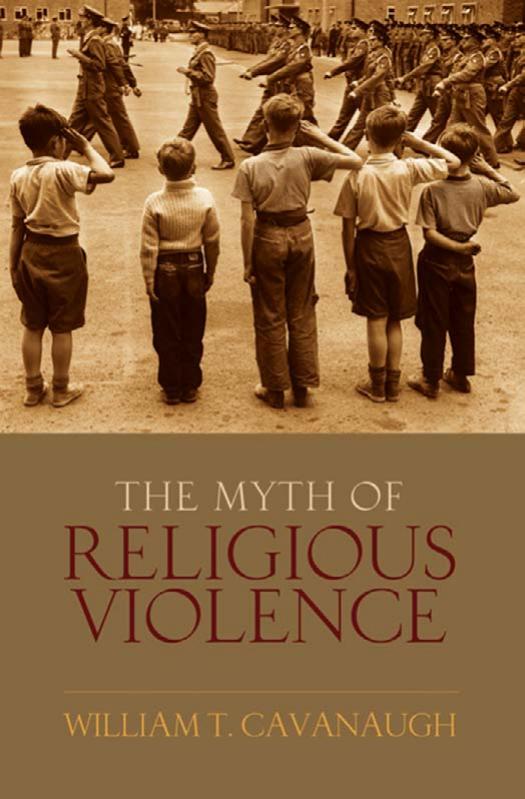The Myth of Religious Violence: Secular Ideology and the Roots of Modern Conflict by William T Cavanaugh

Author:William T Cavanaugh [Cavanaugh, William T]
Language: eng
Format: epub, pdf
Tags: Religion, Atheism, Philosophy, ISBN-13:, 9780195385045
ISBN: 9780199736645
Google: NBXnj1W2ShwC
Amazon: 0195385047
Publisher: Oxford University Press
Published: 2009-09-02T18:30:00+00:00
4
The Uses of the Myth
The fi rst chapter of Martin Marty’s Politics, Religion, and the Common Good begins with a cautionary tale:
In the 1940s, what could incite otherwise law-abiding white Christian Americans to treat a group of fellow white Christian citizens like this?
In Nebraska, one member of this group was castrated.
In Wyoming, another member was tarred and feathered.
In Maine, six members were reportedly beaten.
In Illinois, a caravan of group members was attacked.
In other states, sheriffs looked the other way as people assaulted group members.
The group’s meeting places were also attacked.
Members of the group were commonly arrested and then imprisoned without being charged. 1
Marty reveals that the group in question was the Jehovah’s Witnesses whose offense, in the eyes of their fellow citizens, was to circulate pamphlets such as one entitled “Reasons Why a True Follower of Jesus Christ Cannot Salute a Flag.” In 1940, the Supreme Court had ruled that all American schoolchildren could be required to salute the U.S. fl ag. Marty comments that, with war raging in Europe, “The country had to stand together. ”2 The Jehovah’s Witnesses refused to comply.
Here we have a nation on the brink of war enforcing reverence to its fl ag and violently persecuting a nonviolent group of people who believe that fl ag worship is idolatrous. One would think that the lesson Marty would draw from this story would be a warning against the violence of zealous nationalism. Astonishingly, the punch line of the story is a warning about the dangers of religion in public. Within three years, the Supreme Court reversed itself. Marty says:
But, during the three years before that reversal, it became obvious that religion, which can pose “us” versus “them”—or “them” versus what we think “the state” should be and do—carries risks and can be perceived by others as dangerous. Religion can cause all kinds of trouble in the public arena. The world scene reveals many instances of terror and tragedy created by people acting in the name of religion.3
As Marty uses it in this case, the term “religion” refers not to ritually putting one’s hand over one’s heart and reciting a pledge of allegiance to a piece of cloth endowed with totemic powers. The term religion applies only to the Jehovah’s Witnesses’ refusal to do so. And yet the violence against the Jehovah’s Witnesses is exhibit A in Marty’s warning about the violent tendencies of religion. Marty’s own analysis of the religious symbols and rituals that characterize politics—which I examined in chapter 1—is forgotten as soon as he turns to his argument that religion has a tendency to produce violence.
Clearly, Marty disapproves of coercing people to salute the fl ag. Marty’s sympathies are not with those ardent nationalists who would do violence to nonconformists. Much of Marty’s book is dedicated to showing that allowing religion a voice in public affairs is—as the title of his second chapter indicates—“worth the risk.” Nevertheless, the core of the problem for Marty is something alien and volatile that religion brings to the public arena.
Download
The Myth of Religious Violence: Secular Ideology and the Roots of Modern Conflict by William T Cavanaugh.pdf
This site does not store any files on its server. We only index and link to content provided by other sites. Please contact the content providers to delete copyright contents if any and email us, we'll remove relevant links or contents immediately.
The Lost Art of Listening by Michael P. Nichols(7506)
Why I Am Not A Calvinist by Dr. Peter S. Ruckman(4153)
The Rosicrucians by Christopher McIntosh(3520)
Wicca: a guide for the solitary practitioner by Scott Cunningham(3179)
Signature in the Cell: DNA and the Evidence for Intelligent Design by Stephen C. Meyer(3138)
Real Sex by Lauren F. Winner(3023)
The Holy Spirit by Billy Graham(2952)
To Light a Sacred Flame by Silver RavenWolf(2823)
The End of Faith by Sam Harris(2742)
The Gnostic Gospels by Pagels Elaine(2531)
Waking Up by Sam Harris(2461)
Nine Parts of Desire by Geraldine Brooks(2369)
Jesus by Paul Johnson(2362)
Devil, The by Almond Philip C(2332)
The God delusion by Richard Dawkins(2309)
Heavens on Earth by Michael Shermer(2284)
Kundalini by Gopi Krishna(2185)
Chosen by God by R. C. Sproul(2164)
The Nature of Consciousness by Rupert Spira(2108)
